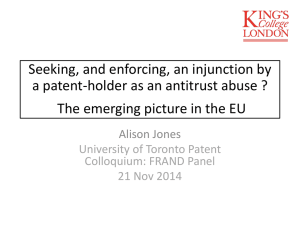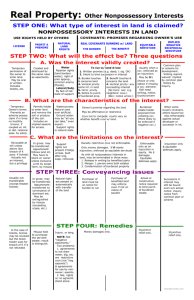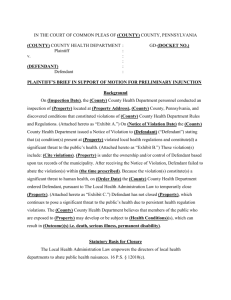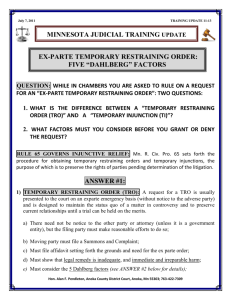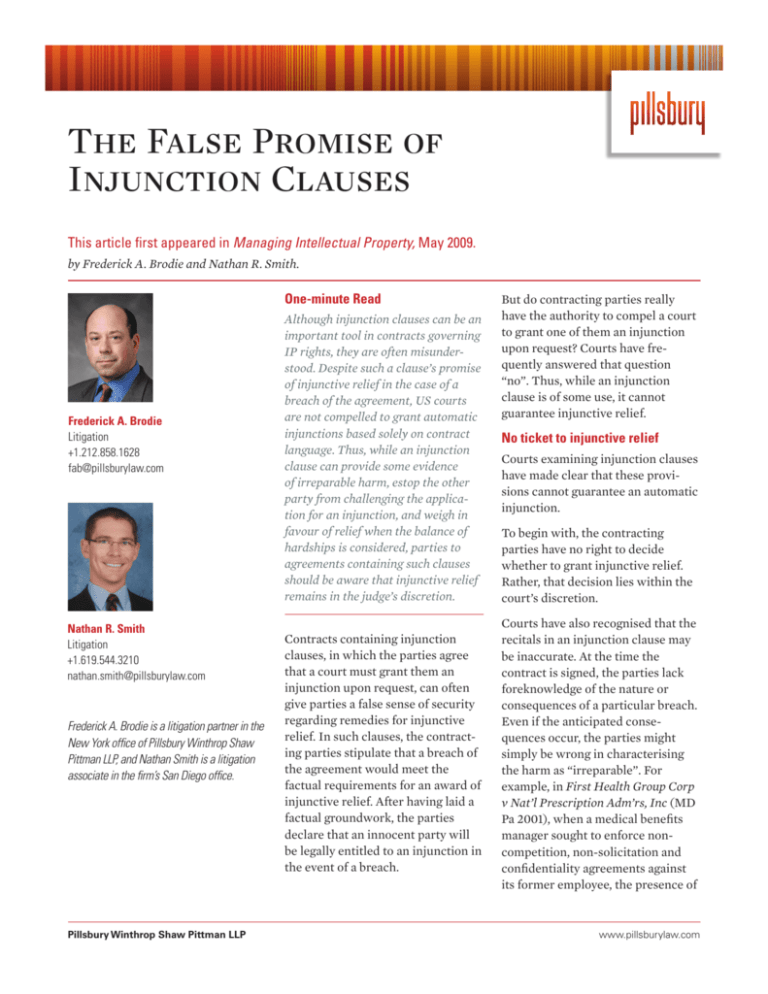
The False Promise of
Injunction Clauses
This article first appeared in Managing Intellectual Property, May 2009.
by Frederick A. Brodie and Nathan R. Smith.
One-minute Read
Frederick A. Brodie
Litigation
+1.212.858.1628
fab@pillsburylaw.com
Nathan R. Smith
Litigation
+1.619.544.3210
nathan.smith@pillsburylaw.com
Frederick A. Brodie is a litigation partner in the
New York office of Pillsbury Winthrop Shaw
Pittman LLP, and Nathan Smith is a litigation
associate in the firm’s San Diego office.
Pillsbury Winthrop Shaw Pittman LLP
Although injunction clauses can be an
important tool in contracts governing
IP rights, they are often misunderstood. Despite such a clause’s promise
of injunctive relief in the case of a
breach of the agreement, US courts
are not compelled to grant automatic
injunctions based solely on contract
language. Thus, while an injunction
clause can provide some evidence
of irreparable harm, estop the other
party from challenging the application for an injunction, and weigh in
favour of relief when the balance of
hardships is considered, parties to
agreements containing such clauses
should be aware that injunctive relief
remains in the judge’s discretion.
Contracts containing injunction
clauses, in which the parties agree
that a court must grant them an
injunction upon request, can often
give parties a false sense of security
regarding remedies for injunctive
relief. In such clauses, the contracting parties stipulate that a breach of
the agreement would meet the
factual requirements for an award of
injunctive relief. After having laid a
factual groundwork, the parties
declare that an innocent party will
be legally entitled to an injunction in
the event of a breach.
But do contracting parties really
have the authority to compel a court
to grant one of them an injunction
upon request? Courts have frequently answered that question
“no”. Thus, while an injunction
clause is of some use, it cannot
guarantee injunctive relief.
No ticket to injunctive relief
Courts examining injunction clauses
have made clear that these provisions cannot guarantee an automatic
injunction.
To begin with, the contracting
parties have no right to decide
whether to grant injunctive relief.
Rather, that decision lies within the
court’s discretion.
Courts have also recognised that the
recitals in an injunction clause may
be inaccurate. At the time the
contract is signed, the parties lack
foreknowledge of the nature or
consequences of a particular breach.
Even if the anticipated consequences occur, the parties might
simply be wrong in characterising
the harm as “irreparable”. For
example, in First Health Group Corp
v Nat’l Prescription Adm’rs, Inc (MD
Pa 2001), when a medical benefits
manager sought to enforce noncompetition, non-solicitation and
confidentiality agreements against
its former employee, the presence of
www.pillsburylaw.com
Litigation
an injunction clause did not avoid
the required analysis of whether the
company would suffer irreparable
harm without a preliminary injunction. The court denied injunctive
relief because the threatened harm
was both speculative and compensable by monetary damages.
that does not mean such clauses are
worthless. In several ways, an
injunction clause may assist a party
seeking an injunction.
Additionally, courts have rejected
the notion that a contract clause, by
itself, provides sufficient evidence to
support preliminary injunctive
relief. For instance, in Dominion
Video Satellite, Inc v Echostar
Satellite Corp (10th Cir 2004), a
federal appellate court reversed a
preliminary injunction enforcing the
plaintiffs exclusive right to transmit
Christian-themed programming
through the defendant’s satellite.
The district court had premised an
injunction on the fact that the
contract granted exclusive rights.
The US Court of Appeals for the
Tenth Circuit wrote: “Were we to
affirm the district court’s finding on
irreparable harm, we would in
essence be ruling that whenever a
party enters into a contract containing some form of exclusivity provision, injunctive relief is automatic
upon breach of the clause even when
the breaching party has refuted
every assertion of specific irreparable harm put forth by the opposing
party. We are not willing to go that
far.”
It is agreed that the rights and
benefits of each of the parties pursuant to this Agreement are uniques
and that no adequate remedy exists
at law if any of the parties shall fail
to perform, or breaches, any of its
obligations hereunder, that it would
be difficult to determine the amount
of damages resulting therefrom, and
that such breach would cause irreparable injury to the non-breaching
lparties. Therefore, the non-breaching
party shall be entitled to injunctive relief to prevent or restrain any
breach of this Agreement.
The net result: contract language
cannot create a right to injunctive
relief when an injunction would
otherwise be inappropriate.
Injunction clauses still may be
useful
Although an injunction clause
cannot guarantee injunctive relief,
Pillsbury Winthrop Shaw Pittman LLP
Variations on this type of injunction
clause are appearing with increaing frequency in IP contracts:
First, while an injunction clause
cannot alone support the entry of an
injunction, the clause does not
constitute evidence of the parties’
intent. When an applicant has
submitted other evidence to support
an injunction application, courts
have given weight to the parties’
contractual statements regarding
harm and remedies. For example, in
North Atlantic Instruments, Inc v
Haber (2d Cir 1999), where the
Second Circuit affirmed a preliminary injunction that protected a list
of client contacts as a trade secret,
the defendant had acknowledged in
his employment agreement that a
breach of his confidentiality obligation would cause the employer
“irreparable injury”.
Further, an injunction clause may
effectively tie the hands of the
opposing party. Having agreed in the
contract that an injunction is
appropriate, the opposing party
could be estopped from claiming
that an injunction would be
improper or unwarranted. Still, this
use of an injunction clause will likely
have limits. Considering a closely
analogous situation, the court in
Roto Die Co v Lesser (WD Va 1995),
refused to enforce a clause that
purportedly estopped a former
employee from challenging his
non-compete agreement. Citing the
law’s disfavour of restraints on trade,
the court observed that employers
“may not circumvent this public
policy merely by including boilerplate language in their employment
agreements”.
An injunction clause may also
provide evidence that the balance of
hardships favours an injunction. The
injunction clause’s presence in the
contract shows that the parties were
aware of the consequences of a
breach, and that they expected a
breach would probably be enjoined.
Thus, an injunction clause may
enable the party seeking an injunction to argue that the relief will not
cause the opposing party undue
hardship: the parties’ contract shows
they expected and intended that an
injunction would be granted.
The bottom line
Despite what business executives
may believe when they sign on the
dotted line, an injunction clause
does not entitle an aggrieved party
to a court order. The decision to
grant injunctive relief remains in the
judge’s discretion. Nevertheless, an
Managing IP
injunction clause can provide some
evidence of irreparable harm, estop
the other party from challenging the
application for an injunction, and
weigh in favour of relief when the
balance of hardships is considered.
To maximise the effectiveness of an
injunction clause, parties seeking
extraordinary interim relief should:
• Focus the clause’s scope. In some
agreements, the injunction clause
applies to all terms of the agreement. In other I contracts, the
injunction clause applies only to
certain specified terms, such as
confidentiality, exclusivity, noncompetition, non-disparagement
or non-solicitation. An injunction clause lacks credibility if it
purports to grant an injunction
when any term of the contract is
breached. The clause should apply
only to those provisions that, if
breached, could give rise to irreparable harm.
• Don’t overstate the parties’
rights. Judges may bristle if a
party argues that it has contracted
for the court to grant injunctive
relief. In addition to reflecting
more accurately the clause’s legal
effect, less presumptuous phrasing
might garner a more favourable
judicial reception. For instance,
rather than stating that an aggrieved party “shall be entitled
to” injunctive relief, an injunction
clause could set forth the parties’
understanding and acknowledgement that “a grant of injunctive
relief would be appropriate”.
• Present independent evidence.
Even with an injunction clause,
the moving party still must prove
its entitlement to injunctive relief
with evidence aside from the
contract provision. Evidence of
irreparable harm could include,
for example, a company officer’s
affidavit describing the loss or disruption of the plaintiff’s customer
relationships, or sworn statements
from consumers attesting to confusion in the marketplace.
• Request specific findings. In
addition to citing the injunction clause, the party seeking an
injunction should propose specific
findings of fact that establish the
elements necessary to support
injunctive relief. Counsel will
benefit from recalling the directive
in Federal Rule of Civil Procedure
65(d)(l) that every injunction must
“state the reasons why it issued”.
An injunction clause can’t hurt the
applicant’s cause and might help it.
However, litigants miscalculate if
they expect the injunction clause
alone to guarantee relief. Relying
solely on an injunction clause to
justify a court order will yield only
disappointment.
Why seek an injunction?
An injunction is a judicial stop sign.
When issued prior to final judgment,
an injunction can maintain the status
quo and prevent harm that would
otherwise occur while litigation is
pending. Emergency injunctive relief
often carries the benefits of speed and
surprise, and can be critically useful
in restoring and safeguarding the
exclusive rights to use intellectual
property.
Injunctions issued by U.S. courts fall
within three procedural types:
1. A temporary restraining order
(TRO) is usually sought at the beginning of a case, and holds existing
arrangements in place on an emergency basis. TROs may be obtained
quickly and, in many cases, without
prior notice to the adverse party. A
TRO has a short lifespan—generally
no more than 10 days.
2.A preliminary injunction, typically granted after an adversarial
hearing, preserves the status quo
until the litigation is concluded.
For example, a preliminary injunction might prevent a defendant
from using the plaintiff ’s trademark or from using information
that the plaintiff claims is a trade
secret, pending final resolution of a
litigation. While the standard may
vary in different jurisdictions, a
preliminary injunction is traditionally granted when the court finds
(i) the movant will suffer irreparable hard if the relief is denied;
(ii) the movant is likely to prevail
on the merits; and (iii) the balance
of hardships weighs in favour of
granting preliminary relief.
3.A permanent injunction may be
included in the judgment granted
at the conclusion of litigation. It
continues in effect indefinitely, until
modified or dissolved by the court.
Pillsbury Winthrop Shaw Pittman LLP | 1540 Broadway | New York, NY 10036 | 1.888.858.9777
© 2009 Pillsbury Winthrop Shaw Pittman LLP. All rights reserved.
www.pillsburylaw.com


